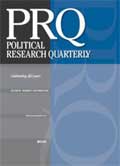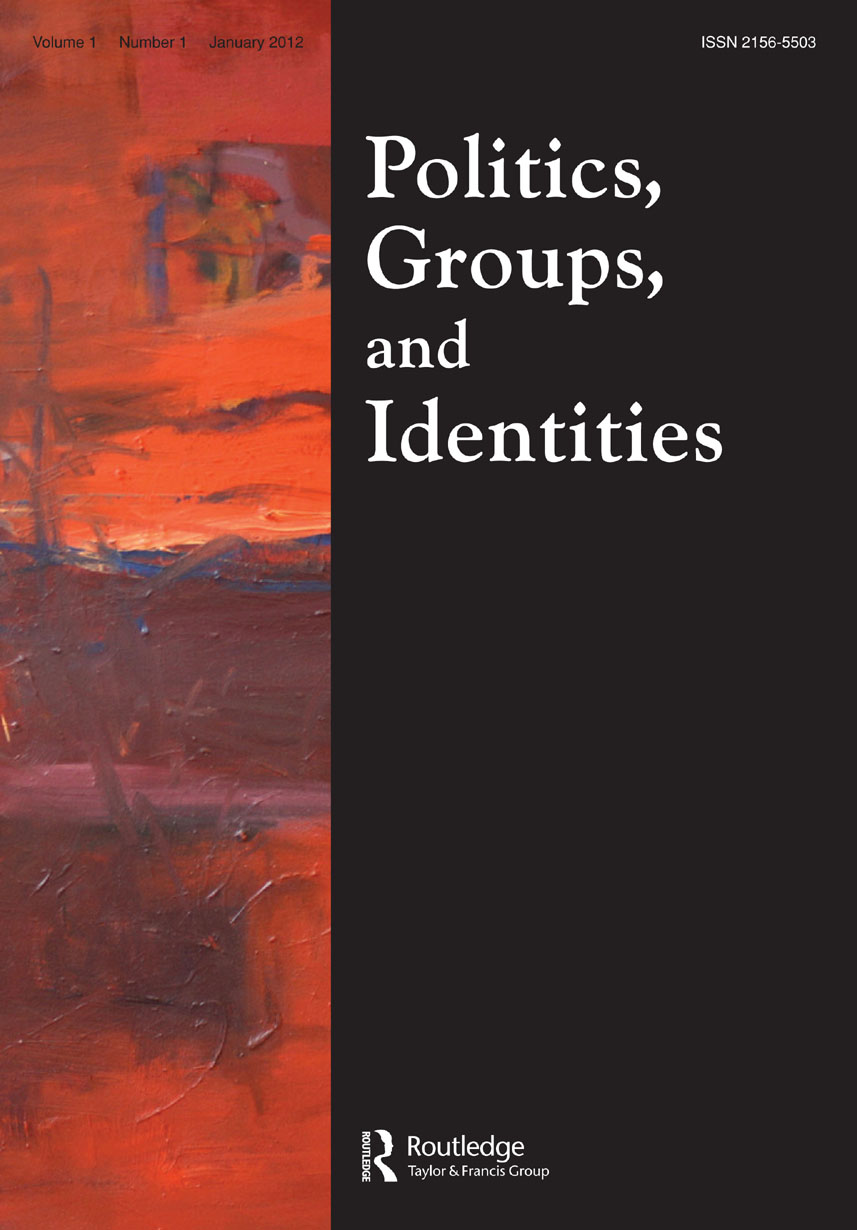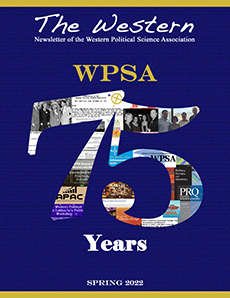
Section 00 – WPSA 2025 Theme Panels
Making Sense of Profound Change
Our WPSA conference this year takes place against a backdrop of turmoil and uncertainty both in the US and elsewhere in the world. Political norms and rules including laws, administrative procedures, and treaties which once set practical boundaries and a measure of stability, seem to have lost their power to control elite behavior, or to structure rules-based relationships among social classes, nations, and international blocs.
This year‘s conference theme asked participants to consider whether this current moment represents a fundamental crisis, whose outcome may profoundly change the world. Will democratic norms as we know them endure, or erode beyond recognition, or be transformed towards something better, more sustainable, and more just?
Conference themes are inevitably suggestions more than directives. Whatever may be happening in the world, scholars are largely committed to existing research agendas and methods. It is clearly impossible to focus the attention of 1000 political scientists on any particular conceptual framing, let alone common research questions.
At the same time, the crisis which is underway impacts our own lives, work, and aspirations as much as it affects everyone else. As a result, many WPSA members have been motivated to reconsider extant theoretical and methodological approaches, bringing them into line with changes we observe in the political world around us. That is, after all, the normal process of observation, testing, and recalibration which characterizes the scientific method at its best.
At my invitation, this year’s section chairs identified outstanding panels which exemplify this process. From those nominations, I’ve selected a small number to highlight new analysis and theory which offer both descriptive and prescriptive insights inspired by our turbulent political environment. The resulting selection of “Theme Panels” detailed below features a wide assortment of scholars, including some of our most senior and most accomplished colleagues, as well as others just beginning their professional journeys. I hope you find these panels to represent the very best our discipline has to offer, to help us understand and respond with confidence to our extraordinary political moment.
— Tony Affigne, WPSA 2025 Program Chair
| Panel 00.0 : President’s Roundtable: “The Impact of the Trump Presidency on Higher Education and Political Science (A Special Discussion with WPSA Presidents)” |
|
Past WPSA Presidents convene for this important discussion, to offer insights on the future of higher education and Political Science Date: Friday, April 19, 2025 - 10:00AM-11:45AM Location: Small Ballroom
Chair(s):
Panel: |
| 00.1 -Activism, Power, Protest, and Social Movements | Co-Sponsored Panel with 01.2 |
|
In recent years, tense political environments worldwide across a variety of regime types have increased the propensity to protest. As a result, several questions of interest have manifested in the literature on this topic: Under what conditions do protests flourish? Are there particular strategies activists adopt to succeed in their goals? What factors drive the intensity through which voters protest? Is it possible for disaffected voters to build power without explicit protest parties or in the face of adversity? The research in this panel investigates such questions in an effort to disclose the potential costs and benefits of protest on democracy and political participation. Date: Thursday, April 17, 10:00AM - 11:45AM Location: Room 407
Chair(s):
Papers: Why Protest?: The Anatomy of Popular Protests and their Significance in Ushering in a Democratic Transition Rahel Afewerky Western Michigan Universityrahelkessete.afewerky@wmich.edu How Do Disaffected Voters Choose? Assessing Protest Voting Beyond Explicit Protest Parties Stefano Camatarri Autonomous University of Barcelonastefano.camatarri@uclouvain.be Marta Gallina Catholic University of Lille marta.gallina@univ-catholille.fr Telegram based activity during the Yellow Vests social movement in France Brigitte Sebbah Paul Sabatier Toulouse III Universitybrigitte.sebbah@iut-tlse3.fr Pierre Ratinaud Jean Jaurès Toulouse II University pierre.ratinaud@univ-tlse2.fr Activists in Time: From Intense Preferences to Political Participation Sophia Wang Yale Universityjinghong.wang@yale.edu Discussants: Elizabeth Chau University of California Irvineeschau1@uci.edu Ti-Ping Lin Freie Universität Berlin yi-ping.lin@fu-berlin.de |
| 00.2 - Abolition(s) | Co-Sponsored Panel with 32.1 |
|
Abolition(s) considers the challenges and the possibilities posed by the relationships between state, law, order, and violence. Collectively, these papers use the frame of abolition as a way of diagnosing forms of violence and as a starting point for contesting domination. In doing so, they raise important questions about both the meaning and the future(s) of abolitionism. Date: Thursday, April 17, 10:00AM - 11:45AM Location: Room 601
Chair(s):
Papers: “To Live Violence-Free Lives”: The “INCITE!-Critical Resistance Statement” as Abolitionist Constitutionalism Daniel Epstein University of Chicagodanielepstein@uchicago.edu Abolition as Antifascism: The Feminist, Democratic Vision of Angela Davis Michael Mirer University of California, Los Angelesmmirer@g.ucla.edu The Legitimation Crisis of the State and Abolition Paul Passavant Hobart and William Smith CollegesPassavant@hws.edu Is Abolition a Theory of (State) Nonviolence? Jakeet Singh York Universityjsingh3@yorku.ca Discussants: Kierstan Kaushal-Carter University of Pennsylvaniakierstkc@law.upenn.edu |
| 00.3 -Reimagining Transformation in a Fragile World |
|
The papers in Reimagining Transformation in a Fragile World challenge us to rethink revolution and decline, proposing innovative ways to embrace care, resilience, and metamorphosis in a world on the edge. By moving beyond utopia, the panel offers critical new insights into how we navigate crisis and reimagine collective futures. Date: Thursday, April 17, 01:15PM - 03:00PM Location: Willapa 5th Floor
Chair(s):
Papers: Beyond Utopia: Revolution as Planetary Temporality Claire Sagan Vassar Collegecsagan@vassar.edu The Wonder of Unbecoming: A Politics of Decline for the Broken-Down Present Jessica Croteau Johns Hopkins Universityjcrotea2@jh.edu “Rains come, the grass grows, rains stop, the grass burns”: Colonialism and Wildfires on Maui Kathy Ferguson University of Hawaii at Manoakferguso@hawaii.edu Comfort, Gentleness, and the Genuine: Embracing Temporary and Shaky Affirmations David DeBole Johns Hopkins Universityddebole1@jhu.edu Discussants: Jairus Grove University of Hawaii at Manoajairusg@hawaii.edu |
| 00.4 -Challenging and Extending Environmental & Climate Justice | Co-Sponsored Panel with 04.2 |
|
This panel features papers that examine how instances of environmental and climate injustice occur around the world and provide implications on how to alleviate them through policy design, practices, and governance. Date: Thursday, April 17, 01:15PM - 03:00PM Location: Room 407
Chair(s):
Papers: Maladaptation and Moral Hazard: Rethinking Climate Justice and Adaptation Governance Meagan Carmack University of Washingtonmcarmack@uw.edu Reconsidering Climate Justice in the Age of Loss and Damage Paul Harris Education University of Hong Kongpharris@eduhk.hk Wealthy countries are not immune to global problems: applying a resilience approach to divergent country-level COVID-19 mortality outcomes and expected climate change adaptation capacity Tova Donovan Levin The George Washington Universitytova.levin@gwu.edu Embedding Environmental Justice into Climate Change Adaptation Policy and Practice David Schlosberg University of Sydneydavid.schlosberg@sydney.edu.au Hannah Della Bosca University of Sydney Hannah.dellabosca@sydney.edu.au Lisa de Kleyn La Trobe University L.deKleyn@latrobe.edu.au Lauren Rickards La Trobe University L.Rickards@latrobe.edu.au Environmental Injustice Across the Atlantic: Sacrifice Zones in Europe Steve Vanderheiden University of Colorado at Bouldervanders@colorado.edu Aine Santala University of Colorado at Boulder aine.santala@colorado.edu Discussants: Cheryl Hall University of South Floridachall@usf.edu Carolina Marques de Mesquita Yale University carolina.marquesdemesquita@yale.edu |
| 00.5 -In Memoriam: The Political Vision of James Scott | Co-Sponsored Panel with 01.12 |
|
The late James Scott argued that non-elites – often dismissed by both social scientists and pundits as “ill-informed,” “easily manipulated,” “passive,” and “weak” – in fact sagely transform their social worlds and political orders through sub-rosa resistance and informal organization. This panel explores the practical implications, the pedagogic possibilities, and the methodological importance of Scott’s thought for the 2020s, a time when many scholars, journalists, and other public intellectuals wonder if liberal democracy might be nearing its deathbed. Date: Thursday, April 17, 01:15PM - 03:00PM Location: Room 401
Chair(s):
Papers: Two Cheers for Practical Knowledge (and Maybe More!) Olivier Ruchet Universite de Lausanneolivier.ruchet@unil.ch Teaching James C. Scott's 'Hidden Transcripts' to Advanced Undergraduates Peregrine Schwartz-Shea University of Utahpsshea@poli-sci.utah.edu Making Waves: Science and Poetry in the Work of James C. Scott Cyrus Zirakzadeh University of ConnecticutCapeern@gmail.com Names, numbers, and categories in James C. Scott’s work Dvora Yanow Wageningen UniversityDvora.Yanow.prof@gmail.com Discussants: Edward Schatz University Oed.schatz@utoronto.ca |
| 00.6 -Hope Springs Eternal: So Why Is Everybody Selling It? | Co-Sponsored Panel with 03.4 |
|
As the climate crisis dangerously accelerates and governments have responded either with insufficient action or with outright denial and obstructionism, we face a range of possible responses, from defiant, radical hope and optimism to resigned preparation for planetary catastrophe. The panel considers how environmental political theory might respond to this situation and what it actually means to talk about concepts like hope, optimism, defiance, radicalism, pessimism, and resignation and how each of these responses can be either productive, debilitating, or both. Date: Thursday, April 17, 03:15PM - 05:00PM Location: Room 503
Chair(s):
Discussants: |
| 00.7 -Addressing the Boundaries of Indigenous Identity | Co-Sponsored Panel with 08.2 |
|
Papers included in this panel address the complexities of Indigenous identity in matters of representation, electoral politics, within economic structures, and in navigating the dynamics of Indigeneity in diaspora and at home. Authors engage questions about the impact of economic incentive structures on identity strength and formation, as well as questions about the impact of legislative quotas for Indigenous people in political negotiations. Other papers examine how gender shapes the political activism of Indigenous elders, and how diasporic online activism shapes and develops collective identity and social movements. Indigenous communities of Hawaii, Taiwan, Canada, Japan, and China are reflected in the research in these papers. Date: Thursday, April 17, 03:15PM - 05:00PM Location: Room 602
Chair(s):
Papers: “A Cursed Line of Mestizos and Tremendous Whores”; the Underside of the Politics of Indigenous Realness Yann Allard-Tremblay McGill Universityyann.allard-tremblay@mcgill.ca Elaine Coburn York University ecoburn@glendon.yorku.ca One State, Two Worlds: Indigenous Representation in Taiwanese National Politics Geoff Allen Utah Tech Universitygeoff.allen@utahtech.edu Online Activism: Examining the Digital Landscape and the Indigenous Identity Politics of the Okinawan/Ryukyuan Diaspora Sara Masaki Occidental Collegesara.masaki@gmail.com Gender and Weathering: The impact of gender on Activism and Advocacy on Native Hawaiian elders Coping and Resilience Strategies Ngoc Phan Hawaii Pacific Universityntphan@hpu.edu Leilani De Lude University of New Mexico ldelude@unm.edu Catherine Jara Independent Scholar catjara2417@gmail.com Lynette Cruz Independent Scholar lcruz96792@gmail.com Economic Opportunities and the Remaking of Identities Jun Fang University of Michiganjunfang@umich.edu Ji Yeon Hong University of Michigan jeanhong@umich.edu Jipeng Zhang Shandong University jipengzhang@sdu.edu.cn Discussants: Minh Do University of Guelphmdo03@uoguelph.ca Mel Fillmore University of Oklahoma melfillmore@ou.edu |
| 00.8 -Environmental & Climate Justice Social Movements | Co-Sponsored Panel with 04.5 |
|
While some lament wide-spread Climate Change inaction, activism to prevent it has been dynamic and changing itself. Insights in this panel shed light on the differing ways people and organization relate to and perceive Climate Change, as well as the action needed to prevent it, through the changing dynamics within activist circles. Date: Friday, April 18, 08:00AM - 09:45AM Location: Room 406
Chair(s):
Papers: Exploring Core-Periphery Subjectivities: Transnational Advocacy Networks and Environmental Movements in India Roomana Hukil Independent Researcherromahukil@gmail.com A Picture of Movement Autonomy and its Predictors Kaleigh Karageorge Purdue Universitykkarageo@purdue.edu “Let’s Dream Together”: Youth Climate Activism and Regenerative Social Movements Carolina Marques de Mesquita Yale Universitycarolina.marquesdemesquita@yale.edu Fighting the “climate agenda”: understanding a facet of the contemporary anti-climate movement in Canada Mary Stuart University of Victoriamarystuart@uvic.ca Theories of Change in Conflict: examining the strategic divide between philanthropy and grassroots climate activism Chie Togami State University of New York College of Environmental Science and Forestryctogami@esf.edu Discussants: David Carruthers San Diego State Universitydcarruth@sdsu.edu Michele McLaughlin-Zamora University of California, Santa Barbara michele_zamora@umail.ucsb.edu |
| 00.9 -Exploring Political (Im)Possibilities | Co-Sponsored Panel with 19.2 |
|
This year’s theme asks us to attend “not just crisis and challenge” but also to our ability to envision and pursue transformative futures. The papers on this panel argue films from Studio Ghibli and the Wachowskis as well as literature from authors such as Ursula K. Le Guin, N.K. Jemisin, and Evgenia Nekrasova provide valuable lessons for our collective political imagination. Date: Friday, April 18, 03:15PM - 05:00PM Location: Room 507
Chair(s):
Papers: Baudrillard and The Matrix: Thinking About Change in the Twenty-First Century Stanley Sadat-Sharkey University of California - Riversidesshar181@ucr.edu Radical Literary Intertext and Imagined Kin: Nekrasova's Novel Kozha as Embodied Empathy Christy Monet New York Universitym.christy@nyu.edu Two Abolitionist Parables: Omelas vs. Um-Helat Andrew Johnson Loyola Marymount Universityandrew.johnson@lmu.edu Fiction as Esoteric Critique of Imperialist Ideology in Japanese Children’s Literature and Cinema Daniel Roberts Harvard Universitydanielroberts@g.harvard.edu Discussants: Christy Monet New York Universitym.christy@nyu.edu |
| 00.10 -Roundtable: Of, With, and For the Movement: The Task of Researching Racial Justice Organizing | Co-Sponsored Panel with 06.7 |
|
The purpose of this discussion roundtable is to bring together a cohort of researchers who study racial justice organizing while sharing the political commitment of these movements, tackling head on the challenges and rewards of conducting social science research that is legible to both scholars and activists. Date: Saturday, April 19, 08:00AM - 09:45AM Location: Room 502
Chair(s):
Discussants: |
| 00.11 -Not Knowing: The Democratic Power of Oblivion, Ignorance, and Silence | Co-Sponsored Panel with 15.11 |
|
This panel questions a tendency in politics and political science to understand ignorance primarily as a civic vice and a force for democratic retrenchment. Contrary to the contemporary preoccupation with information, speech, transparency, and knowledge – and the uncritical assumption that the more of these goods we have, the better – this panel seeks to illuminate the importance of silence, oblivion, and certain forms of ignorance to democratic and individual flourishing. Date: Saturday, April 19, 08:00AM - 09:45AM Location: Room 606
Chair(s):
Papers: Max Scheler and Charles Taylor on Self-Knowledge: Dispatches from Alfaro Adriana Alfara Altamirano Instituto Tecnológico Autónomo de Méxicoadriana.alfaro@itam.mx Rule by Not-Knowing: The Philosophical Sorcery of Plato’s Noble Lie Patrick Giamario University of North Carolina, Greensboroptgiamar@uncg.edu We Live in Oblivion: On the Positive Goods of Arendtian Privacy Lowry Pressly Stanford Universitypressly@stanford.edu Discussants: Shalini Satkunanandan University of California, Davisssatkunanandan@ucdavis.edu |
| 00.12 -Roundtable: The State of Intersectionality Research in Political Science | Co-Sponsored Panel with 06.9 |
|
The present political moment demands that political scientists take seriously the roles of race, gender, sexuality, and class in the lives and behaviors of people in the mass public. As such, in this panel, we will discuss how our discipline has worked to incorporate intersectional methods and approaches over the past three decades and where the discipline is and should be headed next. Date: Saturday, April 19, 03:15PM - 05:00PM Location: Room 502
Chair(s):
Discussants: |
| 00.13 - Democratizing Campaign Contributions: Insights from Seattle's Voucher System | Co-Sponsored Panel with 25.7 |
|
At a time when democratic norms and institutions are being challenged nationally, can electoral innovation at the local level help sustain democracy? This panel draws together academics and municipal officials and campaign strategists to explore the new Seattle Democracy Voucher Program and Jennifer Heerwig’s recently released co-authored book “Democracy Vouchers and the Promise of Fairer Elections in Seattle (PLAC: Political Lessons from American Cities).” This session will provide an opportunity to consider what lessons other localities might take from the early stories about implementation and consequences of the voucher program on campaigns and democracy. Date: Saturday, April 19, 03:15PM - 05:00PM Location: Room 605
Chair(s):
Papers:
Discussants: |


